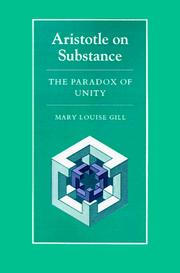| Listing 1 - 2 of 2 |
Sort by
|
Book
ISBN: 0691221596 Year: 2000 Publisher: Princeton, N.J. : Princeton University Press,
Abstract | Keywords | Export | Availability | Bookmark
 Loading...
Loading...Choose an application
- Reference Manager
- EndNote
- RefWorks (Direct export to RefWorks)
Aristotle's Categories can easily seem to be a statement of a naïve, pre-philosophical ontology, centered around ordinary items. Wolfgang-Rainer Mann argues that the treatise, in fact, presents a revolutionary metaphysical picture, one Aristotle arrives at by (implicitly) criticizing Plato and Plato's strange counterparts, the "Late-Learners" of the Sophist. As Mann shows, the Categories reflects Aristotle's discovery that ordinary items are things (objects with properties). Put most starkly, Mann contends that there were no things before Aristotle. The author's argument consists of two main elements. First, a careful investigation of Plato which aims to make sense of the odd-sounding suggestion that things do not show up as things in his ontology. Secondly, an exposition of the theoretical apparatus Aristotle introduces in the Categories--an exposition which shows how Plato's and the Late-Learners' metaphysical pictures cannot help but seem inadequate in light of that apparatus. In doing so, Mann reveals that Aristotle's conception of things--now so engrained in Western thought as to seem a natural expression of common sense--was really a hard-won philosophical achievement. Clear, subtle, and rigorously argued, The Discovery of Things will reshape our understanding of some of Aristotle's--and Plato's--most basic ideas.
Categorie. --- Aristotele. Categorie. --- Abstract Nouns. --- Academy, The. --- Aspect, verbal. --- Becoming. --- Beings. --- Cave Analogy. --- Clusters. --- Common Sense. --- Count Terms. --- Divisibility. --- Dream Theory, the so-called. --- Elements. --- Entities. --- Essentialism: mereological. --- Expressions. --- Features. --- Genera. --- Heteronymy: generic notion of. --- Homonymy: Aristotle’s notion of. --- Identity (through time). --- Incompleteness. --- Ingredients: Anaxagoras’s conception of. --- Late-Learners, the. --- Linnaean Trees. --- Mass-Terms. --- Mixtures. --- Multiformity: Anaxagorean version of. --- Names. --- Natural Kinds. --- Natures. --- Non-Count Terms. --- Nonsubstance Categories. --- Objects. --- One-Over-Many Principle. --- Ordinary Language. --- Parmenides. --- Paronymy. --- Participation. --- Platonic Forms. --- Predicate Nouns. --- Qualified Things. --- Qualities. --- Receptacle, The. --- Replacement, versus Change. --- Self-Predication (SP). --- Sortal Terms. --- Stuffs and Quasi-Stuffs. --- Tests, Linguistic. --- Things. --- Uniformity: Anaxagorean version of. --- Unity: genuine. --- Whole(s).

ISBN: 0691073341 0691020701 9780691073347 Year: 1989 Publisher: Princeton University press
Abstract | Keywords | Export | Availability | Bookmark
 Loading...
Loading...Choose an application
- Reference Manager
- EndNote
- RefWorks (Direct export to RefWorks)
This book explores a fundamental tension in Aristotle's metaphysics: how can an entity such as a living organisma composite generated through the imposition of form on preexisting matterhave the conceptual unity that Aristotle demands of primary substances? Mary Louise Gill bases her treatment of the problem of unity, and of Aristotle's solution, on a fresh interpretation of the relation between matter and form. Challenging the traditional understanding of Aristotelian matter, she argues that material substances are subverted by matter and maintained by form that controls the matter to serve a positive end. The unity of material substances thus involves a dynamic relation between resistant materials and directive ends. Aristotle on Substance offers both a general account of matter, form, and substantial unity and a specific assessment of particular Aristotelian arguments. At every point, Gill engages Aristotle on his own philosophical ground through the detailed analysis of central, and often controversial, texts from the Metaphysics, Physics, On Generation and Corruption, De Anima, De Caelo, and the biological works. The result is a coherent, firmly grounded rethinking of Aristotle's central metaphysical concepts and of his struggle toward a fully consistent theory of material substances.
Matter --- Substance (Philosophy) --- Matière --- Substance (Philosophie) --- History --- Histoire --- Aristotle --- Contributions in matter --- Contributions in substance (Philosophy) --- Et la matière --- Et la substance (Philosophie) --- History. --- -Substance (Philosophy) --- -Matter --- Metaphysics --- Ontology --- Reality --- Atoms --- Dynamics --- Gravitation --- Physics --- -Aristotle --- -Arisṭāṭṭil --- Aristo, --- Aristote --- Aristotel --- Aristotele --- Aristoteles --- Aristóteles, --- Aristòtil --- Aristotile --- Arisṭū --- Arisṭūṭālīs --- Arisutoteresu --- Arystoteles --- Ya-li-shih-to-te --- Ya-li-ssu-to-te --- Yalishiduode --- Yalisiduode --- Ἀριστοτέλης --- Аристотел --- ארסטו --- אריםטו --- אריסטו --- אריסטוטלס --- אריסטוטלוס --- אריסטוטליס --- أرسطاطاليس --- أرسططاليس --- أرسطو --- أرسطوطالس --- أرسطوطاليس --- ابن رشد --- اريسطو --- Contributions in concept of matter --- Contributions in concept of substance --- -History --- -Contributions in concept of matter --- -Aristoteles --- Matière --- Et la matière --- Aristotle. --- Contributions in matter. --- Aristoteles. --- Arisṭāṭṭil --- Αριστοτέλης --- Pseudo Aristotele --- Pseudo-Aristotle --- アリストテレス --- Matiere --- Histoire. --- Et le concept de matiere. --- Et le concept de substance. --- Matter - History. --- Substance (Philosophy) - History. --- Albritton, R. --- Anaximander. --- Barnes, J. --- Cooper, J. --- Democritus. --- Empedocles. --- Furley, D. --- Greco, A. --- Grene, M. --- Happ, H. --- Heraclitus. --- Joachim. --- Kahn, C. --- Kostman, J. --- Lacey, A. R. --- Lennox, J. --- Loux, M. --- Mansion, A. --- Matthewson, P. --- Modrak, D. --- Owens, J. --- Parmenides. --- Prime Mover. --- Putnam, N. --- Rodier, G. --- Thales. --- Wedin, M. --- Wicksteed, P. H. --- Zabarella, I. --- aether. --- blood. --- categories: of change. --- contact. --- corpse. --- elemental transformation. --- essence. --- fetus. --- focal meaning. --- heavenly bodies. --- hylomorphic analysis. --- intellect. --- locomotion (change of place). --- organisms. --- paronymy. --- predication: accidental. --- receptacle. --- spatial. --- thisness. --- uniform materials. --- wearying.
| Listing 1 - 2 of 2 |
Sort by
|

 Search
Search Feedback
Feedback About
About Help
Help News
News